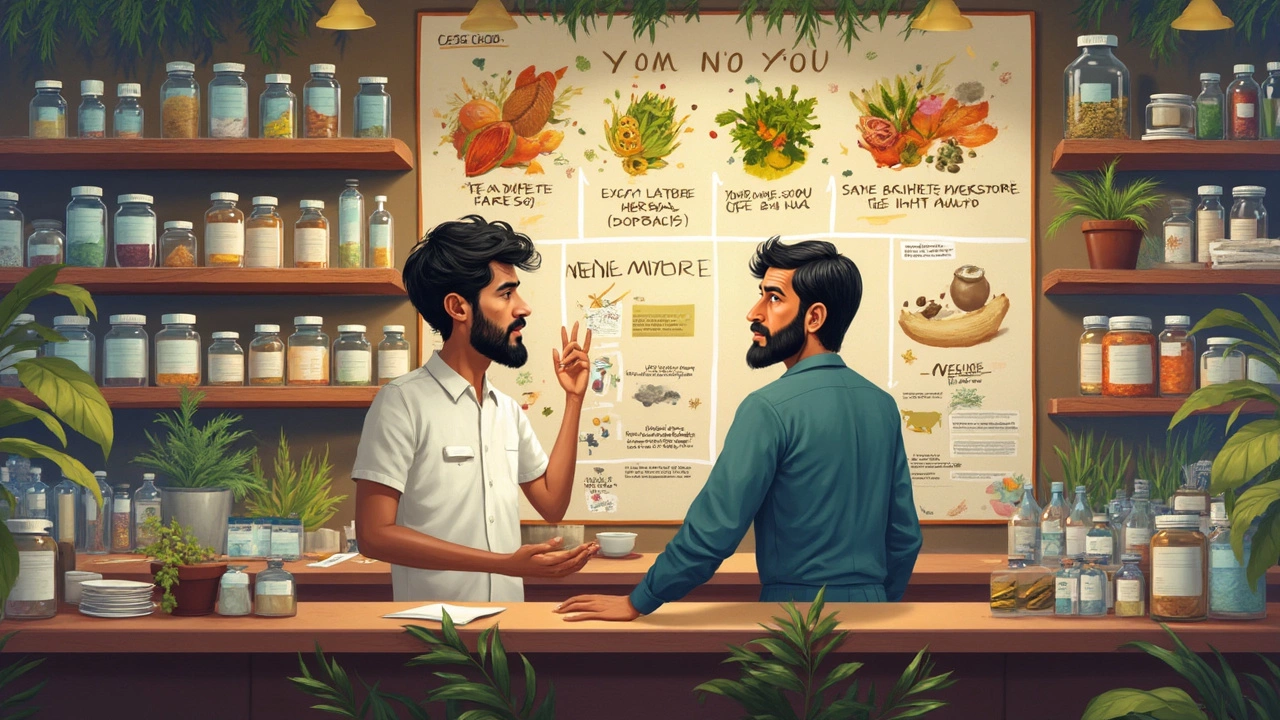
Standing in the herbal supplements aisle can feel like wandering into a world of endless possibilities. The bottles promise better sleep, sharper focus, and a happier gut. But here’s where things get tricky—just because a supplement is natural doesn’t mean it’s safe to mix and match like a smoothie recipe.
Some herb combos can mess with your body in ways you might not expect. For example, mixing St. John’s Wort with ginkgo biloba can crank up your risk of nasty headaches or bleeding issues. It’s not just about doubling up on the benefits—sometimes the mix is like throwing gasoline on a fire. Your body processes these herbs with the same system it uses for medicines, which ups the chance for weird reactions.
If you’ve ever thought, “The more, the better,” when it comes to herbal supplements, this is your wake-up call. Keeping track of what you take and how different herbs can clash could help you dodge some serious health problems. Let’s sort out which combos you should cross off your list—and what to do instead.
- Why Mixing Herbs Can Be Risky
- The Worst Herb Combos to Avoid
- Common Mistakes People Make
- Real Stories and What Went Wrong
- Safe Practices for Herbal Use
- When to Ask for Professional Help
Why Mixing Herbs Can Be Risky
Mixing different herbal supplements sounds harmless, but your body isn’t always on the same page. Herbs might look like plants from your backyard, but inside, they’re packed with active compounds that can seriously mess with each other. When you take two or more at once, those compounds can interact in ways that hit your body harder than you think—sometimes in completely unexpected ways.
One main problem is how herbs affect your liver. The liver is your body’s filter, and it’s in charge of breaking down most supplements and medicines. If two herbs use the same pathway in the liver, they can slow each other down or speed things up too much. For example, St. John’s Wort speeds up how fast the liver breaks stuff down, which can mean your other herbs—or even medications—stop working as they should.
Another risk comes from herbs that affect your blood. Pairing ginkgo biloba with garlic or ginseng, for instance, can thin your blood too much. That definitely increases your risk of bruising or heavy bleeding if you ever get a cut. People who already take blood-thinning meds end up in double trouble if they start mixing these without talking to their doctor.
Check these real numbers to see why being careful matters:
| Herb Combo | Reported Risk | Why It's Risky |
|---|---|---|
| St. John's Wort + Ginkgo Biloba | Up to 3X higher risk of headaches/bleeding | Both affect the nervous and circulatory systems |
| Ginseng + Caffeine | 55% reported higher heart rate | Both stimulate the heart and increase blood pressure |
| Garlic + Warfarin (and similar herbs) | 2X increase in bleeding cases | Both thin blood and increase risk of hemorrhage |
It’s tempting to reach for something “natural” thinking it’ll always be gentle. But herbal combinations can interact with each other or with prescription meds in ways that aren’t obvious. The key takeaway—never mix before knowing how those herbs will behave together in your body. If something sounds too good to be true, ask for advice first. Safety always wins over guessing.
The Worst Herb Combos to Avoid
Mixing the wrong herbal supplements is more common than you’d think, and you really don’t want to find out you’ve made a bad combo when it’s too late. Some blends can mess with your blood pressure, your heart, or even your sleep. Here’s the rundown on mixes you should steer clear of.
- St. John’s Wort and Ginkgo Biloba: This blend is a big no-go. Both herbs affect the way your body handles other medicines and can raise the chance of serious side effects like headaches or bleeding. They can even make medications for mood issues or blood thinners way less effective or more dangerous.
- Ginseng and Caffeine (like Guarana or Yerba Mate): Both increase energy, but taken together, they can jack up your heart rate and blood pressure. Some folks end up with major jitters, anxiety, or even irregular heartbeats.
- Garlic and Ginkgo Biloba: On their own, these help your heart, but mixed, they increase your risk of bleeding, especially if you’re also on blood thinners or aspirin.
- Valerian Root and Kava: People use both for anxiety or sleep, but taking them together can slow your brain and breathing more than you expected—think major drowsiness or feeling zoned out.
- Echinacea and Licorice Root: Echinacea is supposed to boost immunity, but mix it with licorice root and you raise the odds for liver problems, especially if you already have liver concerns.
One bad mix people often overlook is combining multiple herbs that thin blood—like ginger, garlic, ginkgo, and even turmeric. Stack two or more of these and a cut or bruise suddenly takes a lot longer to heal. If you’re taking prescription blood thinners, this becomes a real risk.
It’s tempting to make your own "super blend" from every bottle in the cabinet, but most risky combos happen just from not knowing these herbs mess with the same parts of your body. Less is more when it comes to herbal supplements. If you really need more than one, make sure to double-check each herb and how they interact with anything else you’re taking—even vitamins or regular meds.
Common Mistakes People Make
People mess up with herbal supplements in a few predictable ways, and the fallout can be a lot bigger than they expect. One of the top mistakes? Assuming all herbs are safe because they're “natural.” Plenty of folks pile on different supplements for sleep, stress, joint pain, and energy—without ever checking if those herbs actually play well together.
One really common slip-up is mixing blood thinners like garlic, ginger, and ginkgo biloba. Take these together, and you risk bruising or even major bleeding. Another example: combining St. John's Wort with almost anything else. This herb is notorious for butting heads with other common herbs, as well as prescription drugs. It speeds up how your body clears out chemicals, which means your meds (for heart, depression, birth control, you name it) might just stop working.
Another classic? Doubling up on herbs that work like sedatives, such as valerian root and kava. This can leave you extra groggy or dizzy, which is not exactly a recipe for a great morning. Or, folks sometimes use several immune-boosting herbs, hoping for more power, but end up with an overactive immune response—cue allergic reactions or stomach problems.
- Never checking ingredient lists for hidden extras—one bottle might already contain a blend of herbs, so doubling up gets easy.
- Ignoring dosage instructions, thinking 'natural' means it's fine to take more.
- Skipping professional advice. Most people don’t tell their doctor or pharmacist about supplements, which leaves them in the dark about possible risks.
The number one thing to remember? Just because something is in the herbal aisle doesn’t mean it’s harmless to mix. If you’re ever in doubt about herbal supplements and what goes with what, it’s always smarter to ask than to wing it.

Real Stories and What Went Wrong
Sometimes, learning from real-life mistakes is the best way to remember what not to do. Take Mark, for example. He started taking herbal supplements to deal with low energy and stress. One morning, he mixed kava kava (for anxiety) and valerian (for sleep) after reading online that they were both "relaxing." Within hours, he felt dizzy and overly sedated—so much that he couldn’t focus at work and could barely stay awake behind the wheel. Turns out, mixing two strong sedatives can seriously mess up your nervous system, making basic daily stuff feel like a mountain to climb.
Or look at the case of Gloria, a runner in her 30s. She tried to amp up her performance using ginseng and caffeine-rich guarana. The combo gave her heart palpitations and a jittery feeling that lasted all day. She thought natural meant safe, but too much stimulation ended up sending her to the ER with a pounding heart rate.
There’s more—some herbs can hit your liver surprisingly hard when used together. A small study tracked folks mixing black cohosh and green tea, two herbs found in so many weight loss supplements. Three participants ended up with elevated liver enzymes, a warning sign for liver trouble. That’s proof you can’t just toss every “healthy” herb in your morning shake and hope for the best.
| Herb Combo | Reported Outcome | Who It Happened To |
|---|---|---|
| Kava & Valerian | Extreme sedation, poor focus | Mark, 41 |
| Ginseng & Guarana | Heart palpitations, jitteriness | Gloria, 33 |
| Black Cohosh & Green Tea | Elevated liver enzymes | Study group (3 people) |
| St. John’s Wort & Several Antidepressants | Serotonin syndrome (dangerous upsurge in serotonin) | Well-documented in medical records |
One more lesson from actual events: people who mixed St. John’s Wort with SSRIs (the kind of antidepressant doctors often prescribe) reported everything from confusion and sweating to muscle spasms and dangerously high blood pressure. Doctors call this serotonin syndrome, and it’s no joke—some people ended up hospitalized.
If you’re taking herbal supplements, remember these stories. It’s a lot safer to double-check herbs before blending them than learn the hard way. Write down what you take. Google it, ask your pharmacist, or talk to someone who really knows this stuff. Even one bad combination can cause health problems that stick around long after the herbs are gone.
Safe Practices for Herbal Use
If you want to keep your herbal supplements routine safe and actually helpful, you’ve got to treat these plants with the same respect you’d give any prescription drug. Just because it says “natural” on the bottle doesn’t mean you can pop a handful without a second thought.
Check out some practical steps to stay out of trouble:
- Herbs list – Always track exactly what you’re taking. Write down each supplement, the dose, and timing. Trust me, when you mix two unexpected things, having this list can save you a big headache at the doctor’s office.
- Stick to one new supplement at a time. That way, if you have a bad reaction, you’ll know what caused it, instead of playing detective with five bottles.
- Read labels for warnings about drug interactions or combinations. For example, St. John’s Wort is notorious for messing up how other meds work, including birth control.
- Watch for weird side effects—if you notice things like a racing heart, dizziness, weird bruises, or anything that sets off your gut instincts, stop the new supplement and talk to someone who knows their stuff.
- Avoid combining herbs that have similar effects, like two blood-thinners (ginger and garlic) or too many sedatives (valerian with kava), unless a pro tells you it’s safe.
- Get your info from solid sources. The National Center for Complementary and Integrative Health (NCCIH) posts updated fact sheets on interactions and dangers for common supplements. Don't just trust a blog or social media post.
And just one more thing—if you're already taking prescription meds, herbal supplements can make stuff complicated real fast. Bring your supplement list to your doctor or pharmacist when you go for a checkup. It’s better to mention it up front than deal with some unexpected problem after the fact.
Bottom line: respect your herbs, track what you’re using, and don’t guess with your health. That’s how you make the most out of what these plants have to offer, without the nasty surprises.
When to Ask for Professional Help
There’s no shame in calling in backup, especially when your health is on the line. Sure, a lot of folks grab herbal supplements off the shelf thinking, “What’s the worst that could happen?”—but things get dicey when you're taking other meds, have a medical condition, or you're just not sure what’s in those capsules.
Any time you want to start mixing herbs, or blend them with prescription drugs, it’s smart to chat with a doctor or pharmacist. They’ve seen what can go wrong. For instance, mixing St. John’s Wort with antidepressants can trigger a possibly deadly condition called serotonin syndrome. And if you’re on blood thinners like warfarin, some herbs including ginger, garlic, or ginkgo can mess with your bleeding risk.
- Herbal supplements can seriously change the way medications work by speeding up or slowing down how your body processes them. The liver uses certain enzymes (especially CYP3A4) to break down both herbs and meds, which means bad combos can sneak up on you fast.
- If you get side effects like dizziness, weird bleeding, or new stomach pain after starting a new herb, it’s time to get help—even if you think it’s no big deal.
- Pregnant or breastfeeding? Skip the guessing games entirely and stick to pro advice. Some herbs can harm your baby or mess with milk production.
- If you have health conditions like heart disease, diabetes, or high blood pressure, don’t make moves without a green light from your healthcare team.
| Situation | What to Do |
|---|---|
| Taking prescription drugs | Always check with your doctor or pharmacist before adding herbs |
| Notice new or severe side effects | Stop the supplement and call a pro |
| Pregnant or breastfeeding | Consult your OB/GYN before any herb use |
| Managing a chronic condition | Plan herbal supplements with your specialist |
At the end of the day, nobody knows your body better than you—except maybe the guy or gal with the medical degree. Little questions now can save you from serious issues later. Better safe than stuck in the doctor’s office with regret (or regret’s evil twin: medical bills).





Rohan Talvani
I am a manufacturing expert with over 15 years of experience in streamlining production processes and enhancing operational efficiency. My work often takes me into the technical nitty-gritty of production, but I have a keen interest in writing about medicine in India—an intersection of tradition and modern practices that captivates me. I strive to incorporate innovative approaches in everything I do, whether in my professional role or as an author. My passion for writing about health topics stems from a strong belief in knowledge sharing and its potential to bring about positive changes.
view all postsWrite a comment